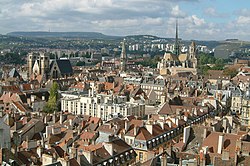Jesel: Difference between revisions
old>Vyvlu |
m (1 revision imported) |
(No difference)
| |
Latest revision as of 21:26, 7 April 2019
Jesel
Vrisdad Jesels Free City of Jesel | |
|---|---|
 Jesel, showing the Samyelkatejral | |
| Country | File:Flag vyv.png Vyvland |
| Province | File:Southwest-flag.png Southwest |
| Parliament constituency | 12 seats |
| Government | |
| • Mayor | Enrig Benson (S) |
| Population | |
| • Total | 1,219,117 |
| Demonym | Jesleer |
| Time zone | UTC-6 |
| Postcode | N0000-N2999 |
| Phone code | 153 (JE) |
| Area Population density | 664km2 1,836/km2 |
| Elevation | 4m |
| Website | www.jesel.rg.vy |
Jesel (pronounced /ʝeːzəl/ (standard), /ʒeːzəl/ (local)) is the third-largest city in Vyvland and the capital and largest city of Southwest province. It lies in the province's north on the lower reaches of the River Fule and bordering the escarpment dividing the central plains of Vyvland with the southern mountainous massif.
Historically the largest city in South Vyvland, Jesel has played a major role in the country's history as an industrial, naval and trade centre. The town has consistently been one of the five largest in Vyvland since approximately 1500 AD, reflecting its strong historic stature. The city today is a focal point for the south of Vyvland, containing a large commercial industry and many cultural attractions and venues in addition to its old town.
Etymology
Jesel's name derives from jees, a modification of early Vyvlander tsees (modern jees), meaning "cheese", and the common suffix -el, denoting a hill. Thus, together the town's name means "cheese hill".
History
Jesel was historically a trading town, and one of the largest medieval towns in Vyvland; during this period, Jesel's 24 medieval churches, which earned it the nickname 'the City of Spires', were constructed. Most prominent among the churches is the Samyelkatejral (St. Samuel's Cathedral), which lies on the edge of the town's market square; its spire is the tallest in the city at 65m.
In the Victorian era coal industry of the nearby Olsence valley also made its mark on the city, was it was the closest access point to a major waterway for the coal mines. As such, Jesel saw industrialisation relatively early compared to the rest of Vyvland, and still has a river shipping port. However, with the Vyvland's decline of industry and mining in addition to the poor economic health of South Vyvland, Jesel's economy slumped, causing large pockets of urban deprivation in the city; a problem exasperated by the growth of middle class commuter areas such as the Syfdyr to the north of the city. As the largest city in South Vyvland, Jesel was the scene of the largest protests against the nationalist regime in the early 1980s.
Geography
The River Fule flows past the southern edge of Jesel's ancient walled city, meeting with the Jeselbryk which runs through the city and historically served as an open sewer. To the south of this, the ground rises up out of the central plain and into the hills of Juls county.
Historically, Jesel has been very liable to flooding due to its position near the end of Vyvland's second-longest river, and floods occurred most years in the city centre. To combat this, in 2004 a new method of minimising flood risk was built to the north of the city in addition to a northern bypass; the road was built with large troughs on either side to carry excess water, which can spill onto the road if necessary and flow safely around the northern edge of the city. As such, no floods have been recorded since.
Economy
Jesel's economy is diverse, with many companies headquartered there due to its position as the largest city in the former South and the largest Vyvlander city south of Vlud. However, traditional manufacturing also makes up a significant sector of the city's economy. The unemployment rate of 7.5% is marginally higher than the national average.
Governance
Jesel City Council is controlled by a left-wing Socialist-United Left-Green coalition, with the National Party being the second-largest and main opposition party. Jesel is an independent city and municipality. At the 2013 general election, the Liberals won five seats in Parliament, the Socialists six and the Nationals one.
Town twinning
Jesel is twinned with Albavia in Iglesiantis, which historically had a tradition of Vyvlander settlement, whose cultural effects continue to this day. It is also twinned with Bethlehem in Luziyca.
Transport
Jesel is served by two main stations. The larger of the two is Synt-Simon station, which handles trains to and from Vlud, Lorence and Olsence; Synt-Simon is the country's fifth-largest station. The other main station is Synt-Davef station, which handles trains to and from Niyport, Wel, Lyksdal and Morn. In addition to Jesel's mainline rail connections, Jesel City Council also operates the Jeselbaan, a rapid transit system which covers both central Jesel and its outer suburbs and commuter towns. Jesel-Olsence Airport to the south-west of the city serves destinations within Vyvland, including connection to the country's international hub at Wesge Airport, and some destinations further afield, including Bondhaven, Bethlehem and Nevanlinna.